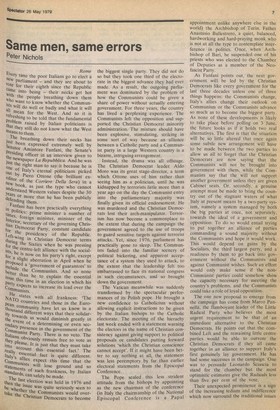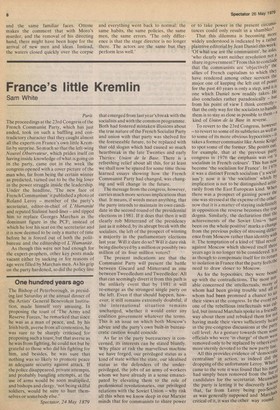Same men, same errors
Peter Nichols
Rome Every time the poor Italians go to elect a new parliament — and they are about to vote for their eighth since the Republic came into being — their necks get hot With the people breathing down them Who want to know whether the Communists will do well or badly and what it will all mean for the West. And so it is refreshing to be told that the fundamental Problem raised by Italian politicians is that they still do not know what the West means to them. The breathing down their necks has lust been expressed extremely well by Senator Amintore Fanfani, the Senate's Presiding officer in an interview given to he newspaper La Repubblica. And he was Just the right man to say it because he is one of Italy's eternal politicians picked out by Piero Ottone (the brilliant. exeditor of the Corriere Della Sera) in a new book, as just the type who cannot understand Western values despite the 30 years or more that he has been publicly defending them. Fanfani has been practically everything in Politics: prime minister a number of tunes, foreign minister, minister of the I.nterior, secretary of the governing ChrisIan Democrat Party, constant candidate 'or the presidency of the Republic. Left-wing in Christian Democrat terms 5.tinng the Sixties when he was pressing r.or the centre-left alliance with the socialSts, he is now on his party's right, except Or a slight aberration in April when he Pr°Posed a 'government of guarantors' to Include the Communists. And so none b. etter than he to explain the essential issue this time in an election in which his Party expects to increase its lead over the Communists. _ He states with all frankness: 'The NATO countries and those in the EuroIt3,ean community have let us know in a .nousand different ways that their solidar towards us would diminish greatly in • e event of a determining or even sececIndary Presence in the government of the o• tnmunist Party. There is no veto. The .Itabans obviously remain free to vote as !neY please. It is just that they must take Into account this essential fact.' The re account essential fact is quite different. Italy's allies expect this time that the Communists will lose ground and so statements of such frankness, by Italian standards, can safely be made. The last election was held in 1976 and b _then the issue was quite seriously seen to e whether the Communists would overtake the Christian Democrats to become the biggest single party. They did not do so but they took one third of the electo rate in the biggest advance they had ever made. As a result, the outgoing parliament was dominated by the problem of how the Communists could be given a share of power without actually entering government. For three years, the country has lived a perplexing experience. The Communists left the opposition and supported the Christian Democrat minority administration. The mixture should have been explosive, stimulating, striking in some sort of way because an alliance between a Catholic party and a Communist party in a large Western country is a bizarre, intriguing arrangement.
Instead, the drama was all offstage. The Christian Democrat leader Aldo Moro was its great stage-director, a term which Ottone uses of him rather than seeing him as a politician, until he was kidnapped by terrorists little more than a year ago on the day the Communist entry into the parliamentary majority was finally given its official endorsement. He was murdered and the Christian Democrats lost their arch-manipulator. Terrorism has now become a commonplace to the extent that during the campaign the government agreed to the use of troops to guard sensitive targets against terrorist attacks. Yet, since 1976, parliament has practically gone to sleep. The Communists faded into the familiar scenery of political bickering, and apparent acceptance of a system they used to attack, to the extent that the leadership felt too embarrassed to face its national congress in such circumstances, and so brought down the government.
The Vatican meanwhile was suddenly transformed by the spectacular performances of its Polish pope. He brought a new confidence to Catholicism without allowing explicit instructions to be given by the Italian bishops to the Catholic electorate. The meeting of the hierachy last week ended with a statement warning the electors in the name of Christian consistency against giving support to political proposals or candidates putting forward solutions 'which the Christian conscience cannot accept'. If it might have been better to say nothing at all, the statement was less peremptory by far than earlier electoral statements from the Episcopal Conference.
The Pope sealed this less strident attitude from the bishops by appointing as the new chairman of the conference (in Italy the chairmanship of the National Episcopal Conference is a Papal appointment unlike anywhere else in the world) the Archbishop of Turin. Father Anastasio Ballestrero, a quiet, balanced, hardworking and hard-praying monk who is not at all the type to contemplate inter ference in politics. Once, when Archbishop of Bari, he suspended one of his priests who was elected to the Chamber of Deputies as a member of the Neofascist Party.
As Fanfani points out, the next government will be led by the Christian Democrats like every government for the last three decades unless one of three things happens: the Communists change, Italy's allies change their outlook on Communism or the Communists advance so much as to become the biggest party. As none of these developments is likely to take place before polling on 3 June, the future looks as if it holds two real alternatives. The first is that the situation will be so little altered that once again some subtle new arrangement will have to be made between the two parties to allow us all to forget that the Christian Democrats are now saying that the Communists will not be brought into government with them, while the Communists say that the will not support another government unless they are given Cabinet seats. Or, secondly, a genuine attempt must be made to bring the country out of the stagnant waters of what Italy at present means by a two-party system, namely a system managed by both the big parties at once, not separately, towards the ideal of a government and opposition. To do so would entail trying to put together an alliance of parties commanding a sound majority without the Communists and hope it would work. This would depend on gains by the Socialists, the third largest party, and a readiness by them to go back into government without the Communists and against Communist wishes. Such an effort would only make sense if the nonCommunist parties could somehow show the capacity necessary for meeting the country's problems, and the Communists could take a role of loyal opposition.
The one new proposal to emerge from the campaign has come from Marco Pannella, the flamboyant leader of the Little Radical Party who believes the most urgent requirement to be that of an immediate alternative to the Christian Democrats. He points out that the combined Left and the remaining little centre parties would be able to outvote the Christian Democrats if they all came together in an alliance to support Italy's first genuinely lay government. He has had some successes in the campaign. One was to persuade Leonardo Sciascia to stand for the chamber but the most optimistic estimates give the Radioals less than five per cent of the vote.
Their unexpected prominence is a sign of the increasing tedium and indifference which now surround the traditional issues and the same familiar faces. Ottone makes the comment that with Moro's murder, and the removal of his directing hand, there might have been hope for the arrival of new men and ideas. Instead, the waters closed quickly over the corpse and everything went back to normal: the same habits, the same policies, the same men, the same errors. 'The only difference is that the stage director is no longer there. The actors are the same but they perform less well.'



































 Previous page
Previous page